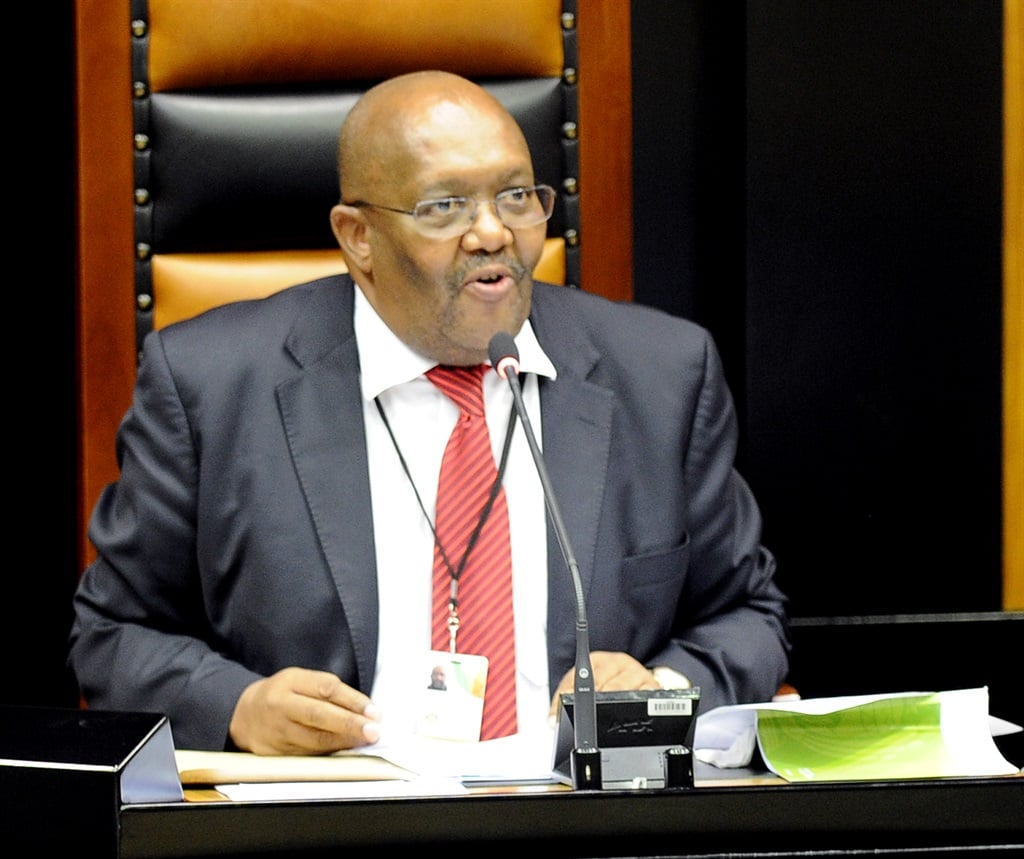
The deputy speaker reflects on his term in office, the role of the courts and this year’s presidential switch
‘Baku pheke ngebodwe elincane, bakushaya ngapha nangapha.”
These were the words once uttered by former president Jacob Zuma to Deputy Speaker Lechesa Tsenoli as he left the podium of the National Assembly in one of the now infamous question-and-answer sessions that came to characterise the fifth Parliament.
I have lost the battle of convincing Tsenoli that he is South Africa’s favourite presiding officer – as decided by social media users, who appreciate the memes he assists them in generating.
In the middle of a deep, throaty laugh, he tells me: “That is propaganda,” before bursting into another bout of infectious laughter and adding: “I blame the ANC for destroying my incognito persona. I can no longer operate incognito.”
With a South African flag standing guard behind him, Tsenoli takes long pauses, as if carefully curating his thoughts about the past few years.
Earlier this year – for the first time since the dawn of the democratic dispensation – Parliament was forced to announce the postponement of the state of the nation address (Sona) as the ANC pondered the decision to recall Zuma.
“It was disappointing that what we were working towards could not happen in the way we wanted, placing Parliament and government in a very unenviable, problematic space, in that it created uncertainty for people across the country. People were wondering what would happen next.
“In our relationships, domestically and outside the country, people wanted answers. So, it was disappointing and frustrating for that reason,” he said.
“It is, in my humble opinion, as if people had acted the way we were all trained in the movement to act and chose a different path. That is the problem. It wasn’t the nicest of times.”
An avid reader, Tsenoli goes through three books a month at least, all of them strictly nonfiction.
He describes the fifth Parliament as “fast and dramatic” and, referring to the rise of social media, says that the speed at which information is disseminated to ordinary South Africans is now unprecedented.
“This is one of the biggest changes in the environment that has affected politics and [my work as] a presiding officer,” he says.
“The work we now do is very public – and because it is very public, the manner in which people in the House conduct themselves – unlike in days before, even when there was a degree of robustness in handling issues – the added factor today is this publicity.”
Regarding the role of the courts in the past few years, he says they serve as a test of the country’s democratic institutions.
It is the courts that have had to step in when Parliament, as the legislative arm of government, allowed some things to “fall through the cracks”.
“The court’s decisions have played a very important role in, firstly, clarifying the powers of Parliament, and also in clarifying its responsibilities and boundaries.
“Decisions have been made that confirmed how the judiciary refused to be bulldozed into entering into what is essentially a legislative, parliamentary and political space. It did not enter that space, leaving that to the legislature.
“In some of the decisions that were made, those decisions were very nuanced; they were not just a blunt condemnation of Parliament.”
Pulling on the legs of his pants as if to illustrate the healthy tug-of-war between the arms of government, Tsenoli does not once lean back into the rusty orange cushions, remaining on the edge of his seat as he speaks about matters in great detail.
The deputy speaker and his colleagues, National Assembly Speaker Baleka Mbete and chairperson of the National Council of Provinces Thandi Modise, have collectively been in the firing line over rulings they have made, particularly on matters related to the former president.
“Theoretically, there are things we could have done differently – but to the extent that the space and the opportunity was provided for, as many times as possible, to ensure that Parliament and its members had the opportunity to deal directly with the president, we never once prevented anybody from doing that.
“What we did do, was refuse to be bulldozed to take positions, which we were often asked to take.”
Elaborating on the isiZulu phrase uttered to him by Zuma, Tsenoli describes that they were caught between a rock and a hard place.
“In other words, he himself was quite conscious of the difficulty of what was happening in Parliament, that our own members were very hard on us as presiding officers and so were the opposition parties.”
Revisiting the whirlwind developments which followed the postponement of Sona – namely, the election of Cyril Ramaphosa as president of the republic and, subsequently, his first Sona – Tsenoli says that he has often been asked while on trips abroad how the transition from the Zuma to the Ramaphosa presidency was so peaceful.
“People always ask: ‘How did you manage that without any loss of life?’ Some of the reasons we were able to manage it in the way that we did – frustrating and disappointing as it was to have to get to that point – were getting leadership in and doing a series of things that provided a degree of confidence in our abilities to successfully deal with the problems identified.
“Nobody said it was going to be easy. The most difficult thing we ended up being taught was that the difficulty would come from ourselves, from within our ranks as the people who were meant to be leading the nation in the best possible direction.
“People must not be disheartened. We are on the right track. We must just not let the foot off the peddle.”
List processes are now under way to determine who will get the call-up to return to the National Assembly. With mere months to go before the curtain falls on the fifth Parliament, Tsenoli is coy about the prospects of his return.
Did he ever consider resigning?
“No, no, no. Not me. I would have liked to have more power to throttle some people – politically, not physically – but not to walk away. And so, there were moments when it was not nice; it was embarrassing, the things that were being reported about our own comrades and what they had done, and what continues to emerge.
“But because I know the big picture of what we are seeking to do, it would have been naive of me not to expect those manifestations.”
TALK TO US
How would you rate Tsenoli’s performance as deputy speaker of Parliament?
SMS us on 35697 using the keyword TSENOLI and tell us what you think. Please include your name and province. SMSes cost R1.50. By participating, you agree to receive occasional marketing material




 Publications
Publications
 Partners
Partners








